Dollar hits record 1,084,000 rials in Iran ahead of snapback deadline
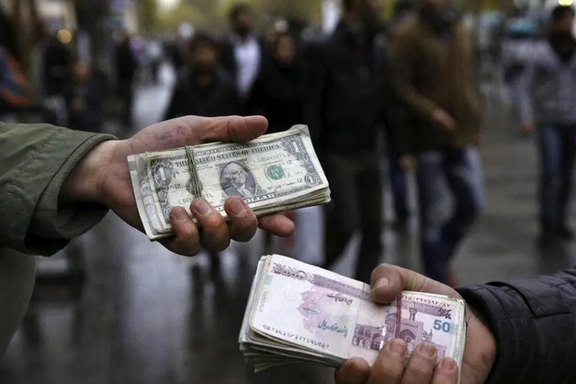
The US dollar rose to a record 1,084,000 rials on Thursday, deepening pressure on Iran’s currency as the deadline for the UN snapback sanctions mechanism approaches.

The US dollar rose to a record 1,084,000 rials on Thursday, deepening pressure on Iran’s currency as the deadline for the UN snapback sanctions mechanism approaches.
On Tuesday, Iran’s central bank governor Mohammadreza Farzin sought to reassure business leaders that the country’s foreign exchange and gold reserves remain secure.
On Wednesday, Oil Minister Mohsen Paknejad said that reimposition of UN sanctions will not add "new burdensome restrictions" on the country’s oil sales.

China has sharply increased crude imports declared from Indonesia in recent months, an unusual surge that points to possible new workarounds for Iranian oil exports, Bloomberg reported on Wednesday.
Customs data show 2.7 million tons of Indonesian crude -- around 630,000 barrels per day -- arrived in August, far exceeding Indonesia’s average output of 580,000 bpd in 2024, most of which was consumed domestically. The flows followed a sharp jump in July.
China, the biggest buyer of Iranian oil, officially reported no imports from Tehran since mid-2022. In the meantime, it buys more oil from Malaysia than the country produces. In the past two months, shipments from Malaysia -- often used for ship-to-ship transfers and rebranded cargoes -- have dropped more than 30%.
Analysts say operators are now shifting tactics.
“This is just part of a continuing evolution of the operators’ tactics, hiding what they’re doing,” said Charlie Brown, a senior adviser at United Against Nuclear Iran. “They’re still doing ship-to-ship transfers in the same area off Malaysia; the basic trade pattern remains the same.”
Vessel-tracking data show tankers including the Aquaris, Yuhan, Pola and Pix signaled calls at Indonesia’s Kabil port near Singapore -- a hub not connected to crude exports but close to established transfer zones off Malaysia. These tankers later discharged cargoes in Chinese ports such as Qingdao, Rizhao and Dalian.
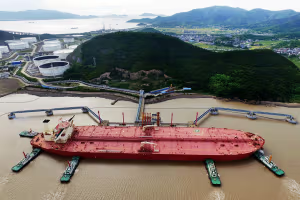

Bloomberg cited the Aquaris as receiving Iranian crude from the sanctioned Sorion tanker before unloading in Qingdao in June. The Yuhan and Pola followed similar patterns, according to data from Vortexa and Kpler.
Queries to Indonesia’s energy ministry, Pertamina, Kabil port, and China’s foreign ministry went unanswered, Bloomberg reported.
China’s reliance on Iranian oil has provided Tehran with a crucial economic lifeline as US sanctions continue to target the trade.
The looming return of UN sanctions on Iran is unlikely to curb its oil exports but could boost China’s refiners, who already take nearly 80% of Tehran’s 1.6 million barrels per day at steep discounts, Reuters reported on Wednesday.

Iran’s centuries-old carpet industry, once a symbol of cultural prestige and a $2 billion export powerhouse, is unraveling under US sanctions, shifting consumer tastes and rising competition, industry officials and traders say.
Exports of handmade rugs, which stood at more than $400 million in 2017, fell to just $41.7 million in the year to March 2025, according to customs data -- a drop of over 95% from their peak in the early 1990s, AFPreported.
The collapse followed Washington’s 2018 reimposition of sanctions, cutting off the US market that once bought more than 70% of Iranian carpets.
“During the unkind and cruel US sanctions, we lost our biggest buyer,” said Zahra Kamani, head of Iran’s National Carpet Center.
Germany, the UAE, Japan and China are now Iran’s top destinations, but volumes remain a fraction of past levels.
Rivals including India, China, Nepal, Turkey and Pakistan have captured global market share, with some rugs even imported back into Iran, traders said.



At least two million Iranians, many of them rural women, depend on carpet-weaving but earn only a few dollars a day. “We are losing even part of our domestic market due to imports,” Tehran trader Hamed Nabizadeh told AFP.
With tourism also in decline, fewer foreign visitors buy rugs, and even those who do are deterred by price tags of $30,000 or more for silk carpets.
Officials insist revival is possible. Trade Minister Mohammad Atabak said in June that new trade and currency policies could help resuscitate exports.
Analysts argue adapting designs to modern décor trends, using social media for sales and branding carpets more effectively may be key.
But with Iran’s currency plunging, many families at home are turning to cheaper factory-made rugs, and a centuries-old craft risks fading into a relic of the past.
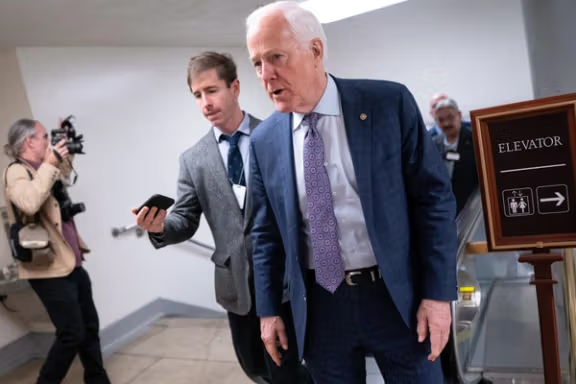
Republican Senator John Cornyn called on European allies to support and intensify sanctions against Iran, calling it a leading state sponsor of terrorism and an aggressor.
The United Kingdom, France and Germany last month triggered the so-called "snapback" of international sanctions on Tehran which are set to take effect on September 28.
"We need our European allies to step up and agree that these sanctions are critical," Cornyn told Iran International.
"Iran is the number one state sponsor of terrorism. Thank goodness President Trump disrupted their nuclear weapons program. But their attitude and conduct remain unchanged, and these sanctions are entirely justified," the Texas senator said.
Cornyn’s push follows a letter led by Senator Jim Risch and signed by 50 Senate Republicans last week. The letter praised the UK, France, and Germany for re-activating the UN sanctions on Iran and urged sustained pressure until Tehran’s nuclear program is fully dismantled.
The move reflects growing United States concerns over Iran’s nuclear progress and its support for proxy groups across the region.
At the UN General Assembly on Wednesday, Iranian President Masoud Pezeshkian accused the US of betraying trust, particularly after its 2018 withdrawal from the JCPOA nuclear deal, and stressed Iran’s willingness to pursue diplomacy to resolve the crisis.
Pezeshkian denied that Iran has ever sought nuclear weapons, despite the US and Israeli assertions in June that Tehran was racing toward a bomb.
"I hereby declare once more that Iran has never sought and will never seek to build a nuclear bomb," Pezeshkian said.
Addressing European powers, Pezeshkian accused Germany, Britain, and France of acting in bad faith by reinstating UN sanctions.
"The three European states, having failed through a decade of bad faith and by supporting military aggression to subdue the proud people of Iran, at the behest of the United States, sought to reinstate terminated UN Security Council resolutions through pressure, coercion, and blatant abuse," the Iranian president said.
French President Emmanuel Macron also met with Pezeshkian on the sidelines of the UN meeting, warning that time was running out. "An agreement remains possible — only hours left; it is up to Iran," Macron posted on X.
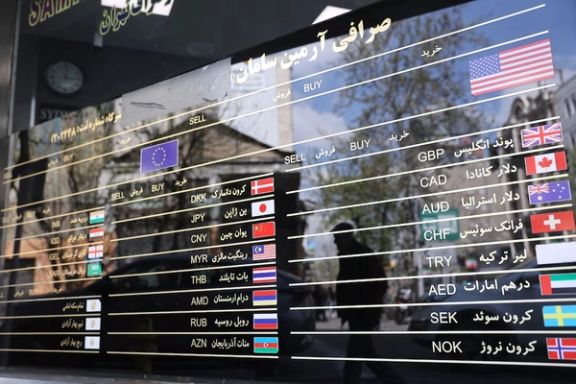
The Iranian rial fell sharply on Wednesday as markets braced for the reimposition of UN sanctions under the snapback mechanism, with the US dollar trading above 1,074,000 rials on the open market, more than 2% higher than a day earlier.
Sterling climbed to 1,440,000 rials, while the price of the “Emami” gold coin rose 3.5% to 1,070,000,000 rials, reflecting heightened demand for hard assets amid economic uncertainty.
On Tuesday, Iran’s central bank governor Mohammadreza Farzin sought to reassure business leaders that the country’s foreign exchange and gold reserves remain secure.
Also on Wednesday, Oil Minister Mohsen Paknejad said that reimposition of UN sanctions will not add "new burdensome restrictions" on the country’s oil sales.
"In the last years, we have faced such severe restrictions from the unjust and unilateral US sanctions that, in practice, [UN sanctions] won't add much to this situation," Paknejad said after a cabinet meeting.
The oil and petrochemical sector contributed roughly a quarter of Iran’s GDP in 2024, making continued exports critical to Tehran’s economy as sanctions loom.
Reuters also reported on Wednesday that the revival of sanctions is unlikely to halt Tehran’s vital crude exports but could hand Chinese refiners a lucrative advantage, giving them greater access to discounted Iranian oil.
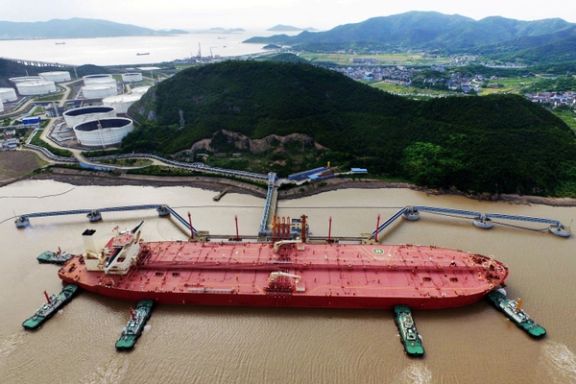
The looming revival of UN sanctions on Iran is unlikely to halt Tehran’s vital crude exports but could hand Chinese refiners a lucrative advantage, giving them greater access to discounted Iranian oil, Reuters reported on Wednesday.
Britain, France and Germany triggered the 30-day “snapback” process on August 28, accusing Iran of breaching the 2015 nuclear deal. If no agreement is reached, restrictions including an arms embargo, asset freezes and bans on nuclear-related technology will return at the end of the month.
The move would also provide a legal basis for the EU and Britain to reimpose banking, shipping and energy curbs.
But as Reuters’ columnist Ron Bousso writes, past experience shows Western sanctions have had limited lasting impact on Iranian oil flows.
Exports collapsed to 444,000 barrels per day (bpd) in 2020 after Washington reimposed sanctions but have since rebounded to 1.6 million bpd this year, with nearly 80% going to China, according to data from analytics firm Kpler.


Despite years of US efforts to expand restrictions on tankers, traders and refiners, Iran has developed an opaque network of intermediaries, uninsured vessels and ship-to-ship transfers to keep crude flowing.
“These whack-a-mole efforts have had little and often short-lived impact,” Bousso wrote.
Analysts say the snapback may deter some Asian buyers but not Beijing, which has already defied Western sanctions by importing sanctioned Russian LNG cargoes. Chinese refiners could even gain leverage to secure Iranian oil at steeper discounts, further undermining the effectiveness of Western sanctions.
The oil and petrochemical sector contributed roughly a quarter of Iran’s GDP in 2024, making continued exports critical to Tehran’s economy as sanctions loom.